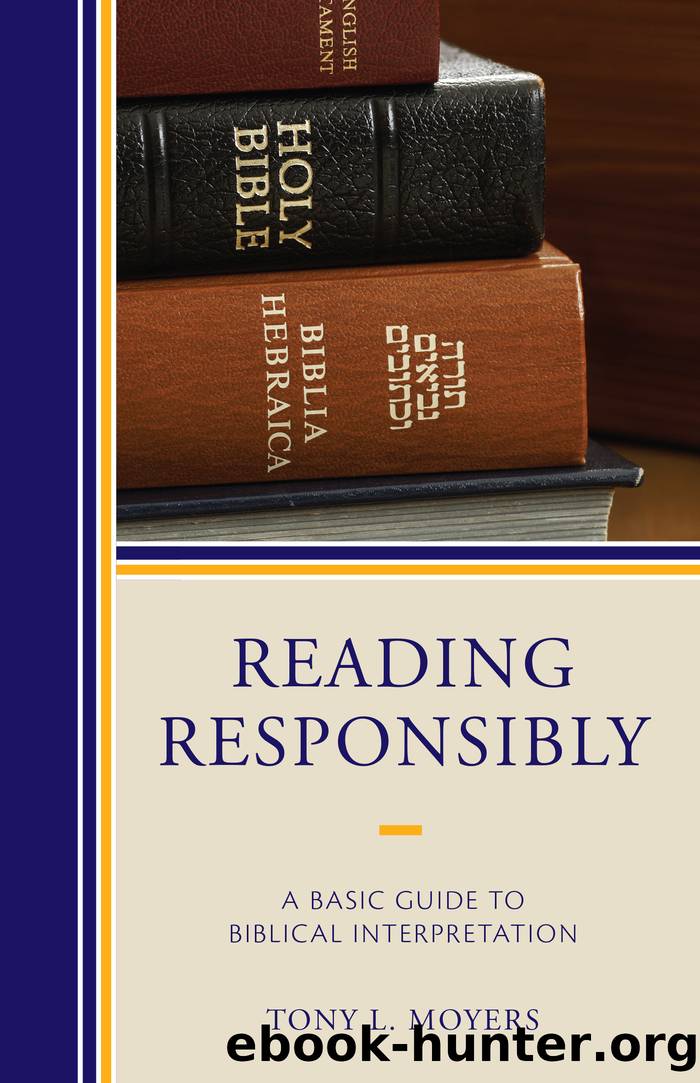Reading Responsibly by Moyers Tony L.;

Author:Moyers, Tony L.;
Language: eng
Format: epub
Tags: undefined
Publisher: UPA
Published: 2012-08-15T00:00:00+00:00
1 Peter 2:11â3:22.
This passage contains the household code. The household code defines the basic structure of family life in ancient Greece and Rome. According to Jewish writers Philo and Josephus, this is also true of Palestine as well. Some scholars maintain that the household code either came into Christian literature through Stoic influence or from Hellenistic Judaism, which âdeveloped this code out of the Decalogueâ (Ex 20:12).[45] David L. Balch, however, has cogently traced the household code back to its roots in the Greek political ethics of Plato and Aristotle.[46] In Aristotle, for instance, there is a relationship between the city and house concerning the matter of those who rule (the superior member) and those who are ruled (the inferior member). This code is characterized by assigning certain obligations to pairs so that âone member of the pair is to be subordinate to the other.â[47] In the case of the household, the husband is to rule the wife, the parents the children, and the master the slaves. Balch says these ideas are popular in the Roman period,[48] and he also traces them to Bithynia near the time of 1 Peter's composition.[49]
It is true that the topic of household is present in Philo, a Hellenistic Jewish writer, and certain Jewish Christian writers.[50] Balch says this code served an apologetic function for Philo and Josephus both Jewish writers. The need for an apologetic or defense derives from the fact that the Romans are critical of foreign, eastern cults such as Dionysius and Isis. The Romans feel that such cults âproduced immorality (especially among Roman women) and sedition.â The apologetic of Josephus clearly defends the Jews from this type of criticism.[51] Balch also thinks that the household code in 1 Peter functions the same way. This topic is active in the Asia Minor province of Bithynia. Bithynia is one of the provinces named in 1 Peter 1.
Keeping the discussion brief, one can say that the letter dates to a time between 70â93 C.E. The author is an anonymous Christian. Writing under a pseudonym, in this case, Peter is a relatively common practice at that time. The letter is addressed to the exiles. They seem to feel threatened with the possibility of persecution. Evidence from the letter does not indicate that the state is at odds or hostile to this Christian community. There are indications in the text that real tensions exist between Christians and their neighbors. The author and most of the addressees appear to be Hellenistic Jews while some are Gentiles.
The household code seems to function as a defense. It assures the Romans that the Christian community is not a threat to Roman authority. They too share the views of the code accepted by the larger Roman society. The author's message appears to encourage Asia Minor Christians to conform to Roman laws and avoid unnecessary conflict with Romans. The message is that Christians have no reason to fear the state, and they have no reason not to be good citizens (1 Pt 2:11â17).
Download
This site does not store any files on its server. We only index and link to content provided by other sites. Please contact the content providers to delete copyright contents if any and email us, we'll remove relevant links or contents immediately.
The Power of Myth by Joseph Campbell & Bill Moyers(698)
Four Shakespearean Period Pieces by Margreta de Grazia(698)
A Social History of the Media by Peter Burke & Peter Burke(645)
Inseparable by Emma Donoghue(617)
The Complete Correspondence 1928-1940 by Theodor W. Adorno & Walter Benjamin(517)
Bodies from the Library 3 by Tony Medawar(489)
The Spike by Mark Humphries;(478)
A Theory of Narrative Drawing by Simon Grennan(474)
Culture by Terry Eagleton(470)
World Philology by(459)
Ideology by Eagleton Terry;(456)
Farnsworth's Classical English Rhetoric by Ward Farnsworth(449)
A Reader’s Companion to J. D. Salinger’s The Catcher in the Rye by Peter Beidler(435)
Adam Smith by Jonathan Conlin(427)
Comic Genius: Portraits of Funny People by(415)
Game of Thrones and Philosophy by William Irwin(405)
Monkey King by Wu Cheng'en(405)
High Albania by M. Edith Durham(401)
Early Departures by Justin A. Reynolds(386)
